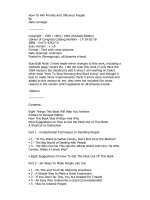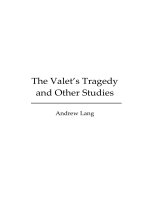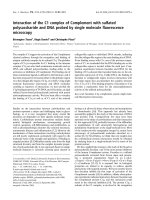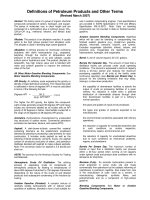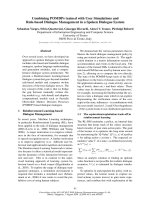I Trained with Greg Jackson And Other Greats. by Dave Rodway doc
Bạn đang xem bản rút gọn của tài liệu. Xem và tải ngay bản đầy đủ của tài liệu tại đây (58.79 KB, 7 trang )
I Trained with Greg Jackson
And Other Greats.
by Dave Rodway
copyright 2012 by Dave Rodway
ISBN#
published by Dave Rodway at Smashwords
Recently, I’ve been reading Fighting Words by Mike Straka. I’ve noticed that Greg
Jackson’s name comes up regularly, which isn’t surprising. He’s well known in the
martial arts world, especially in MMA circles, because he trained some of the guys who
would eventually become MMA stars. But I didn’t know anything about Jackson or the
style he taught until I went to my first class with him in Albuquerque, New Mexico, in
1998. I came from the more traditional Karate style of Goju Ryu, and I hadn’t focused
much on grappling or submissions, techniques Jackson was known for. As I got into
Fighting Words, I realized pretty quickly that the book would be interesting and exciting,
because of how much people were talking about Jackson. What I didn’t expect was how
many memories of my own training would pop up for me as I read.
I started training in karate in Rockland County, New York, not far from Manhattan and
the big lights of the big city. I was living in Spring Valley, New York, about a 15-minute
drive from the dojo. My high school friend, Tom Fitzpatrick, and I were the same age,
and we trained karate together. Tom’s older brother Kevin, was a karate “outlaw.” Back
in those days if you were known for hurting people intentionally, you were labeled an
“outlaw,” and schools would ask you not to come back. You’d have a hard time training,
because there weren’t as many schools as there are today, and those schools didn’t
want “outlaws.”
Though I was training according to accepted traditions, I was fascinated by Kevin’s
“outlaw” status. When I found out he practiced karate, I wanted to learn more about him.
Tom wasn’t really interested in what Kevin did with karate, but I was. My own older
brother practiced karate, but he wouldn’t show me anything, or invite me to practice with
him. I was hoping Kevin would show me what he did with karate, since I couldn’t count
on my own brother to share the “secrets” with me. My own brother kept me at arm’s
length, forbidding me to touch any of his stuff. When I was about ten, before I ever
started training in karate, I remember my brother had issues of Black Belt magazine
lying around near his weights, in the basement. I looked longingly at those magazines.
My favorite one was from the ‘60s. It was a painting of a karateka front-kicking a knife-
holding mugger right under the jaw. I was fascinated by this image, and I always
thought, “man, if I could only do that . . . .” Once, around that same time, I took my
brother’s off-limits gi out of the closet, put it on, and went outside on the lawn and flung
myself around like I knew what I was doing. When I was done, I put the Gi back in the
closet complete with grass stains. My brother wanted to kill me, and I don’t blame him.
Kevin Fitzpatrick enjoyed toying with me when I got older, even though I wasn’t training
yet. He knew I wanted an inside look at his “outlaw” world. I would go over to Tom’s
house and if Kevin was there, he’d laugh and so “ok, let’s spar.” He used hand
techniques and footwork I’d never seen before. I was amazed. I continued to get beat
up and frustrated by Kevin. Eventually he suggested I go to the New City Judo Center in
New City, New York. It was just a few minutes’ drive from where I lived, so I decided I’d
check it out.
I don’t remember much about signing up, but I definitely remember the Sensei. Sensei
Chuck Merriman. At the time he was the official bodyguard for the rock band Kiss. He
was awe-inspiring and he required everyone to train HARD. I loved it. I had found my
place. Tom and I joined together, but Tom left early on. I stayed. Back in those days we
trained hard, then we drank beers. Amazing. We smoked and drank and trained as hard
as we could. After close to two years of that, my family life was getting interesting, and I
wanted to leave home. Unfortunately, I had to take a break from karate. But I knew I’d
be back.
Some time passed, things settled down, and I started getting my life in order. And just
as I’d known it would, my interest in karate popped back up. This time I was interested
in learning a different style. Tae Kwon Do was becoming more and more popular, so I
thought I’d investigate. I found a dojo, and the Sensei was Byung Min Kim. I enjoyed the
new style, I liked being back into martial arts, and I liked the people I met while I was
training with Byung Min Kim.
I met a great martial artist while I was training Tae Kwon Do, whose name was Yoroslov. He
invited me to practice privately with just a few other dedicated warriors. We trained very
hard at his little stone house. We trained days, nights, in the rain and in the snow. We
practiced our strikes on the trees in the back yard. Yoroslov was in the process of taking the
life from one of those trees, because he’d been striking it so long. The training I did with
Yoroslov was the training I loved the most. But life presented a different plan and I was
forced to take another break from martial arts. I’d been working hard trying to build up a
career as a drummer, and it was time to move to Manhattan full time to pursue my
drumming career. My career took me away from this dojo, but I knew I wouldn’t forget about
martial arts.
Sometime between 1985 and 1987, I found yet another great teacher and school, within
walking distance from my apartment in Manhattan. This great teacher was Grandmaster S.
Henry Cho. On the first night of classes I attended, I was asked to spar. I started with the
lowest-ranking student, and I continued sparring each student, one by one, the ranks
climbing as I went. I fought and fought until I was exhausted. Finally, one student did a
bone-crushing axe kick to my left collar bone. Sparring was over for that night. I participated
in many tournaments as a member of that dojo, and I won trophies for kata and kumite.
There was a tournament held at Madison Square Garden’s Felt Forum around 1986. I think
it was the 25
th
US Open, and I was asked by Grandmaster Cho to be ring timekeeper. That
was an amazing experience. But once again, life intervened, forcing me to temporarily stop
my training.
My life took an interesting turn at this time. I had just started as a bike messenger in
Manhattan, a job I loved, and held for 3 years. But my personal life wasn’t going as well. I
was “experimenting” with a variety of substances and not feeling too good about myself. It
was a challenging time. I moved from Manhattan and commuted to Brooklyn daily. Even
though things were changing, my interest in martial arts came up again, and in what is now
known as DUMBO, I found a karate school within walking distance from my apartment. This
was also walking distance from the Atlantic subway stop from Manhattan. When I began
training there, I smoked, and of course, I often smelled like cigarettes. This confused some
of the students, because they couldn’t understand why someone who trained in martial arts
would smoke. To them, the two didn’t go together. I don’t think they go together now, either.
One morning before class I was sparring a young Gulf War veteran, when he roundhouse
kicked my right eyebrow. Blood oozed out. For the first time I learned what being a “bleeder”
meant. I didn’t have stitches, but I could have used them. Another time in class we were
instructed to pair up, facing each other. One partner held the belt of the other, who was in a
stance, and pushed forward. The partner (the pushee) would try to maintain his balance
while being forced backwards, then he’d try to regain his stance again, without losing his
balance. While we were working on this stance and balance exercise, I rolled my left
foot/ankle as the pushee. Ouch. I continued to train, limping and hopping. After class I
limped home in growing pain. I showered, then took the subway to my bike messenger job.
Once I touched the pedal of the bike with that foot, I knew I wouldn’t work. If I had had any
sense, I would have gone to a doctor. Instead, I went to a musician friend’s place in the
East Village and ‘self medicated’ for the weekend, another one of my “experiments.” One
hazy weekend wasn’t enough recovery time. It would take more than a year just before I
was able to walk without a limp. I went back to work riding the bike, but stopped karate yet
again. To this day, when running or practicing kata, my injured ankle reminds me of the old
days.
Coming back to karate some time later, I found Budo Kai-Kan, run by Grandmaster Rico
Guy. It was an amazing school and he was an amazing teacher. If one got there early
enough on Saturday morning, one could watch the “Sword class”. One of the Senseis there
—Sensei Nado—was an Corrections Officer on Rikers Island, and came to class after work.
In the changing room, as he got out of his uniform, he could be observed placing his off-
duty .45 in the lock box and locking it up before class. I thought he would never need that
thing with way he trained! Training at Budo Kai-Kan was tough, in that dojo, we put on
protective gear (including chest protection), and did full-contact sparring as part of our daily
class routine. I liked that kind of training, and look back on those training sessions with
satisfaction. The school is still in business, and I’m glad it’s successful.
I eventually left Budo Kai-Kan, and martial arts training was put on the back burner. It would
be years before I returned to any kind of practice. By 1998, I’d moved out of New York and
was living in New Mexico. During this time, I gave up the “experimental” life. I got married
and had a baby girl, and even though I was still working on my drumming career, I was also
in the process of becoming a Bernalillo County Deputy Sheriff. I had taken the physical and
written exams, and had passed the “interview” stage. I was waiting for the department to
find enough qualified applicants to start the next training class. I was still drumming, but that
was only a part-time occupation. There wasn’t much to do while I was waiting, so I was
really interested when people began to mention that I should check out “the guy who
teaches martial arts to all the cops in town.” Apparently this “guy” knew how to handle bad
guys without hurting them or facing legal charges. I thought I could use this kind of
knowledge, since I know that simply shooting someone doesn’t always work. I thought I
should investigate.
So I went to the Greg Jackson School of Gaidojutsu. I didn’t know who he was back then.
He had a little storefront dojo near Menaul Boulevard, in Albuquerque. When I visited the
dojo, Jackson was very relaxed, and asked me many questions about my training. I could
see by his expression that he was sizing me up, possibly as an amateur. It seemed like he
thought I was another one of those big-headed “karate guys” who wanted to fight the guys
in his school, who were beginning to create the fighting style of what is now known as MMA.
I don’t think Jackson was taking the interview very seriously. But he admitted me to the
school, and I began to train. After a few classes Jackson asked me, and a much larger
fellow to “just wrestle” for a few minutes. This guy was heavy! I didn’t know how to move
him, but I learned not too long after that. The classes were amazing.
I didn’t know it then, but I was training right next to some very talented guys who are
professional fighters now. We newbies were close to the front of the dojo working on
shooting in, or arm bars, while in the back of the dojo there were guys wrestling with one
arm tucked in their belts behind their backs. Those guys were serious. I didn’t know who
those guys were at the time, but in the years since we all trained in the same dojo, some of
them have become household names in the MMA world. A lot of that is thanks to Jackson,
who showed students how to control people with takedowns and arm bars, techniques that
perhaps most police officers weren’t using, or didn’t know about. These were the techniques
that helped allow the law-enforcement community to control people without using deadly
force, and without opening themselves up to legal liabilities. I eventually brought my older
brother Bill into the Jackson class, since Bill was also training to join the Sheriff’s
department as a volunteer. Jackson referred to us as The Bruise Brothers.
I knew Greg Jackson to be a caring, giving, community-minded person. More than once,
while performing at various music venues in Albuquerque, I saw Greg Jackson and a few of
his students walking among the crowds of people. I shook his hand and bowed whenever I
saw him. He once told me that he and some of his students were willing to do volunteer
security for the clubs I worked in. I thought that was very cool. I admired Jackson, and Bill
and I trained hard while we were members of Jackson’s school, and we learned a lot. But
once again, life took me away from training.
In 2002 I started working at New Mexico Sports and Wellness as a sales counselor. I wasn’t
training at this time, but soon enough, I would be. At work, I met a quiet personal trainer
named Keith Jardine. We got to know each other a little bit as colleagues, and I told him
about my training with Greg Jackson years earlier, and he just listened. Keith was just
beginning his pro career as a fighter. He went pro just one year prior to my meeting him. I
used to see him at the local coffee place, Satellite Coffee. When we bumped into each
other, he was polite and kind, and we casually chatted about work. I didn’t know much
about his real passion then. Eventually I moved offices, out of the area, and I didn’t see
Jardine much after that. But I always remembered him, and as MMA grew in popularity and
the fights were televised, I began to see his name in matchups, and our conversations. The
only time I ever bought a pay-per-view fight was when Keith Jardine fought Chuck Liddell. I
had told my wife that I’d worked in the same circles as Jardine, so I wanted to see him fight,
see how far he had come. My wife and I watched the Jardine/Liddell fight together, and I
enjoyed seeing the quiet guy I had known back in his early days come so far. What a
fighter.
At this time, I was busy working, and raising my daughter—I was divorced, and was a single
dad. I had my hands full, but I was working out at the gym as regularly as I could. One day,
while working out, I heard the familiar sound of a karate class in session. Tucked away in
the back of this vast
gym was a group exercise classroom, and in that room Sensei Dr.
Charles L. Rasmussen was instructing a class full of talented students. The martial arts
bug bit me again at that moment, and I began training in Jujitsu for the first time. Sensei
Rasmussen was always approachable and available for his students. I enjoyed training
with him and his students. He made everyone feel welcome, and invited students to his
home for meals. Sensei Rasmussen was also a gifted musician, and had many other
talents. I’m grateful for the time I spent training with him.
About two years after I began training with Sensei Rasmussen, my life took another
turn, and I relocated to California. I was still drumming in bands, and had begun giving
private drumming lessons to students of all ages. Time was passing: I was no longer a
young man, my daughter was growing up, and I was focused on my home life. But
karate was never far from my mind. Eventually, I began to look around for another dojo,
and I found Goju Karate Center. It was very close by, and would mark my return to my
original karate roots, Goju-Ryu. I train there now, under Sensei Paul Enfield, and his
wife Michelle. They are great teachers and are adept at presenting challenging training
for students of all fitness levels, capabilities, and ages. Since I’m no longer a young
man, my training had to change, and this approach appeals to me. I have plenty of
injuries, and though I want to train, I also want to be careful. I try not to complain.
After all this time, I keep returning to martial arts, because it’s my passion. Sensei Paul
says, “no matter what, just keep training,” and I do. I will keep training.
